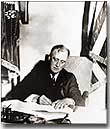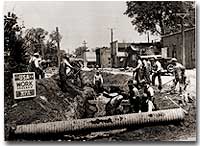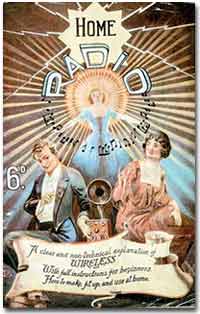
49. The New Deal

Within days of his inauguration, President Roosevelt presented the Emergency Banking Act to Congress, which quickly approved the legislation. Here, Roosevelt signs the bill, making it law.
When America hit rock bottom, Americans expected bold leadership.
Herbert Hoover was perceived as doing nothing to help when the nation was in its darkest hour. When the votes were tallied in 1932, Americans made a strong statement for change, and sent Franklin D. Roosevelt to the White House. Ironically, Roosevelt made few concrete proposals during the campaign, merely promising "a new deal for the American people." The plan that ultimately emerged during his Presidency was among the most ambitious in the history of the United States.

With the unemployment rate at an incredible 25%, FDR realized that jobs were needed to get people back on their feet. A few of the 8,500,000 participants in the New Deal's Works Progress Administration are shown here hard at work in Tuskeegee, Alabama.
Franklin Roosevelt was born in 1882 to a wealthy New York industrialist. The fifth cousin of Theodore Roosevelt, FDR became involved in politics at a young age. A strong supporter of Woodrow Wilson and the League of Nations, Roosevelt became the unsuccessful Democratic candidate for Vice-President in 1920. The following year he contracted polio, and learned that he could never walk without crutches again.
Roosevelt campaigned hard for fellow New Yorker Al Smith's 1924 and 1928 Presidential bids and then received Smith's support to run for governor of New York. In his two terms as governor of New York, Roosevelt earned a reputation as a progressive reformer. He then threw his hat into the ring of Presidential politics.

Radio's golden era coincided with Roosevelt's presidency. Radio shows entertained, advertised, and made an escape for American audiences. Roosevelt wisely used his weekly "Fireside Chats" to keep in touch with the populace.
Roosevelt had no grand strategy to fix the Depression. He was a bold experimenter. FDR liked to examine an idea and evaluate it on its philosophical merits. The details could be negotiated later. If it worked, fine. If not, he was more than willing to start over with a new plan. He surrounded himself with competent advisors, and delegated authority with discretion and confidence. As a master of the radio, his confidence was contagious among the American populace.
Before his first term expired, Roosevelt signed legislation aimed at fixing banks and the stock market. He approved plans to aid the unemployed and the nations farmers. He began housing initiatives and ventures into public-owned electric power. New Deal programs aided industrialists and laborers alike. His friends and enemies grew with every act he signed into law.
The New Deal sparked a revolution in American public thought regarding the relationship between the people and the federal government.





